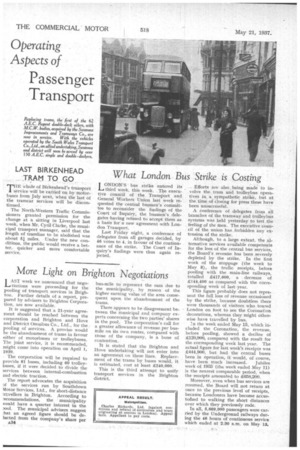What London Bus Strike is Costing
Page 68

If you've noticed an error in this article please click here to report it so we can fix it.
I ONDON'S bus strike entered its third week, this week. The executive council of the Transport and General Workers Union last Week requested the central busmen's committee to reconsider the findings of the Court of Inquiry, the busmen's delegates -having refused to accept them as a basis for a new agreement .with London Transport.
Last Friday night, a conference of delegates from all garages decided, by 46 votes to 4, in favour of the continuance of the strike, The Court of Inquiry's findings were thus again rejected. Efforts are also _being made to involve the tram and trolleybus operatives in a sympathetic strike, but at the time of closing for Press these have been u nsuccess ful A Conference of delega*es from all branches of the tramway and trolleybuS systems was held yesterday to test the feeling of the men. The executive council of the union has forbidden any extension of the strike.
Although, to a large extent, the alternative services available compensate for the loss of the central bus services, the Board's revenue has been severely depleted by the strike. In the first week of the stoppage (the week to May 8), the traffic receipts, before pooling with the main-line railways, totalled 2417,600, a decrease of £144,400 as compared with the corresponding week of last-year.
This figure probably does not represent the full loss of revenue occasioned by the strike, because doubtless there were thousands of visitors who toured London on foot to see the Coronation decorations, whereas they might otherwise have travelled by bus.
2n the week ended May 15, which included the Coronation, the revenue, before pooling, showed a decline of £120,900, compared with the result for the corresponding week last year. The actual figure for last week's receipts was £444,900, but had the central buses been in operation, it would, of course, have been much increased. Jubilee week of 1935 (the week ended May 11) is the nearest comparable period, when the receipts amounted to £658,200.
Moreover, even when bus services are resumed, the Board will not return at once to the previous level of receipts, because Londoners have become accustoffied to walking the short distances over which they previously rode.
In all, 5,669,000 passengers were carried by the Underground railways during the 46 hours of continuous service which ended at 2.30 a.m. on May 13.




































































































